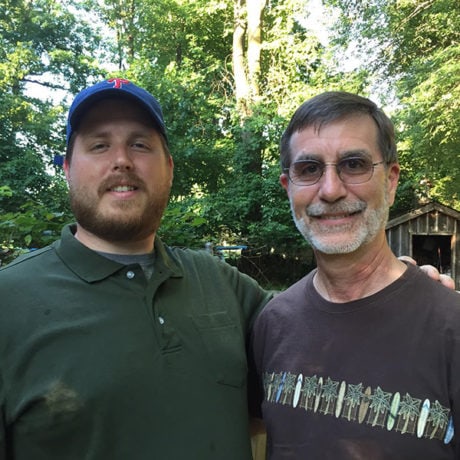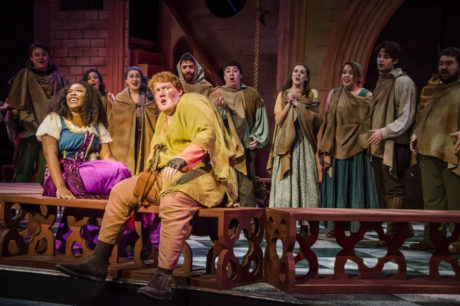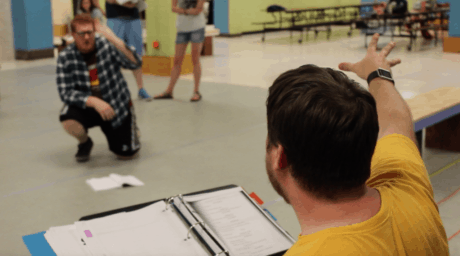Harry Dietzler, the executive and artistic director of Upper Darby Summer Stage, one of America’s oldest and most successful theater programs for young adults, founded the Summer Stage in 1976 as a 20-year-old drama teacher. The program has trained dozens of locally and nationally known performers, including such luminaries as Tina Fey. Dietzler won the 2011 Barrymore Lifetime Achievement Award from the Philadelphia theater community for his work.

Henrik Eger: Harry, you built the Summer Stage into a well-respected company but with a smaller budget compared to most regional theaters in Philadelphia. How did you manage to obtain the rights from Disney to produce the new musical The Hunchback of Notre Dame?
Harry Dietzler: Disney decided to not bring the show to Broadway and turned the licensing over to Music Theatre International. A former Summer Stager is on staff there and I wrote to him to ask if there was a chance we could do it. After the other regional theaters in the Philadelphia area turned down the show, we received an invitation to produce it last July.
Looking back at 42 years of directing, what were your main criteria in finding and selecting the best actors, singers, and dancers, along with a great behind-the-scenes team?
I have always looked for directors who not only have the training in theater to guide a large cast of young people but also share the mission of Summer Stage. We add an extra element to our program based on the Leslie Bricusse song, “Fill the World with Love.”
We believe theater is our way of sharing the joy and excitement in each of us with an audience. Our staff have to be committed to a positive process for our performers, building them up, giving them confidence, and encouraging them to share what is inside each of them with our audience.
This year you presented the largest production ever in your history, with an artistic and technical team to match.
We were fortunate to have the professional expertise of our technical director Andrew Thompson, our set designer Martin Dallago, our costume designer Mary Folino, our choreographer Jenna Rogalski, our lighting designer Jose Antonio Dom Chacon, our prop master Patrick Ahern, and last but not least, our stage manager, Jenna Shira Brandow, who corralled an enormous cast.
What were some of the most unexpected things that happened during the development of this moving and memorable show?
The set construction was very challenging. We got behind in the work because of the great detail that the design required and had to hire extra carpenters and painters to complete it. They worked 12 hour days and long weekend hours, sometimes even until 2 or 3 in the morning.

Your cast sang, danced, and acted at a high professional level. Where did you find them?
I did not expect that the four main leads, Patrick J. Walsh [Quasimodo], Chris Monaco [Dom Frollo], Sierra Wilson [Esmeralda], and Tristan Horan [Phoebus] would all be long time Summer Stagers. I had thought we would need to look to a wider pool of talent, but the best were right here in our Summer Stage program!
The sound of your orchestra blew me away.
Harry: Before I committed to producing this show there were several people I knew we had to have on board and our two musical directors and our sound designer were top on my list. Gina Giachero assembles a wonderful orchestra each year for us and outdid herself this year. They are all professionals or college music majors, and each is mic’d by our amazing sound designer, Amanda Hanna, who studies sound design at the University of the Arts.
A good sound system all around can greatly bring out the quality of the singers.
We knew that our new, state of the art sound system was up to the task of balancing all of these elements. Eric Longo is an excellent musical director and rehearsed the choir. Amanda added them into the mix, along with 32 individual body mics. I don’t know of many theaters outside of Broadway who place such demands on a sound designer who is still a college student. Actually, I never doubted Amanda. She was the least of our worries!
Is there anything else you would like to share?
It has been a dream come true to produce this musical and we are thrilled to introduce it to so many people. The reaction has been overwhelming. Thank you all.
You, your son Jeff, who directed the mammoth production of The Hunchback of Notre Dame, and everyone on and off stage pulled it off beautifully. Let the bells of Notre Dame ring.

Jeffrey (Jeff) Dietzler is the Director of Performing Arts at St. Elizabeth High School in Wilmington, DE. For the past 10 years he has served not only in that role, but also as stage manager, choreographer, fight director, and as a technical director on over 25 productions. During the summer, Jeff joins his father Harry at Upper Darby Summer Stage, with Jeff working as a company director. He has directed five productions for Summer Stage, including 2017’s The Hunchback of Notre Dame.
Henrik Eger: Jeff, what were the most important things you learned from observing your father at work?
Jeff Dietzler: A sense of humility. He never wants the spotlight shown on him and when it is, he quickly reminds people that it takes so much more than just him to make this program work. He always gives credit to the hundreds of staff members, parents, volunteers, students, and audience members who have made Summer Stage so successful. This taught me that each position from top to bottom is just as important. Without this understanding, the collaboration necessary in theater would not be possible.
You managed to bring on board a great cast with some outstanding performers. Tell us about your criteria in making your selections and getting those rising stars to sign up?
When we were making our final casting decisions, one of the most important criteria we looked at was having performers who were willing to make specific choices, to do something different, and to step out of their comfort zone while still being able to work together as an ensemble.
This show is about the story. It brings us back to one of the most basic styles of narrative: the Greek chorus. With this performance type, the actors are required to go from performing as a single entity, to becoming their own individual characters. I made it clear to the cast from day one that this show, more than any other I have ever worked on, is truly an ensemble piece. To get people to come out to audition, we emphasized the beauty and excitement of the music. It is hard to hear this amazing score and not show some sense of interest to be a part of it.
What were some of the most unexpected things that happened during the development of this moving and memorable show?
Putting together a production of this size is already an overwhelming task, but what made it even more difficult is that the scene changes never stop. Each moment flows directly from one to the next, rarely taking a breath. Sequences such as “Topsy Turvy” demonstrate the necessity for the choreographer (Jenna Rogalski) and director to work in perfect sync because the dance shifts right into scene work and quickly back into dance again.
With such an overly complex script, how did you solve some of those technical complications?
As we rehearsed this show, we had to begin with the bare bones and continually come back to these multitudes of sequences and layers. With the limited rehearsal schedule, it often felt like we would not have time to put in every detail, but this cast is amazing and began to understand what we were trying to do. They would add in their own character choices to fill in any little gaps that appeared to be missing. The end result is a constant flow of storytelling that captures the audience at every moment.

I was convinced that you had piped in a recording of one of the finest orchestras in the U.S., but according to the program, you actually hid all the musicians somewhere on stage.
Many people are just as surprised as you to learn that the orchestra is live, but a show like this could not have it any other way. There are so many acting moments that are timed perfectly to the music that it would be a nightmare for someone trying to work off recorded tracks.
This is a production that relies heavily on the music, not just in what is sung, but in the underscoring as well. As we began development, our music director, Gina Giachero, and choir director, Eric Longo, came in with a similar understanding, which allowed the show to come together as well as it did.
Tell us about the logistics of having the full cast and chorus, along with an entire orchestra, on stage, something even big-budget theaters have difficulty pulling off.
Fitting so many people into this space, we had to rethink our normal show set-up, which usually places the orchestra in the band shell above the stage. We knew we had to see the choir as they are an integral part of the story and create the voice of the bells and cathedral. The band shell became the best place to put them. They would be seen, but still leave room for the set and actors. Since the chorus was taking the shell, we had to find a new place for the pit. The band room, located off stage left, seemed like the perfect place.
A ghost orchestra and a chorus that cannot see the conductor?
With our brand new sound system, miking the band was no different than when they were in the shell. Our cast has always worked blindly from the conductor, so nothing changed there, but the choir needed to see Gina. To solve this problem, we hid video monitors in the set up near the choir, which provided a live stream to the band room. It took a lot of forward thinking, but the end result justified all the work.
Is there anything else you would like to share?
I have a tremendous amount of passion for Disney’s Hunchback of Notre Dame, for the music, and for the beautiful story being told. This has been my favorite score since seeing the 1996 movie. I have listened to the original cast recording non-stop, even well before I was offered the chance to direct this particular show.
When I first saw the stage musical at Paper Mill Playhouse [in Millburn, NJ] in 2015, I was blown away yet again, and I wanted to make sure that everyone who saw it was able feel the same emotion and amazement that I did.
From the reactions of the audience to our Summer Stage production, I think we have done our job—made possible by the wonderful collaboration of our amazing production staff, fabulous designers, and wonderful cast, crew, and orchestra.
It truly took a village to make this show a reality!
Running Time: Two hours and 15 minutes, including an intermission.
The Hunchback of Notre Dame plays through August 5, 2017 at the Upper Darby Performing Arts Center – 601 North Lansdowne Avenue, in Drexel Hill, PA. For tickets, call 610-622-1189, or purchase them online.




